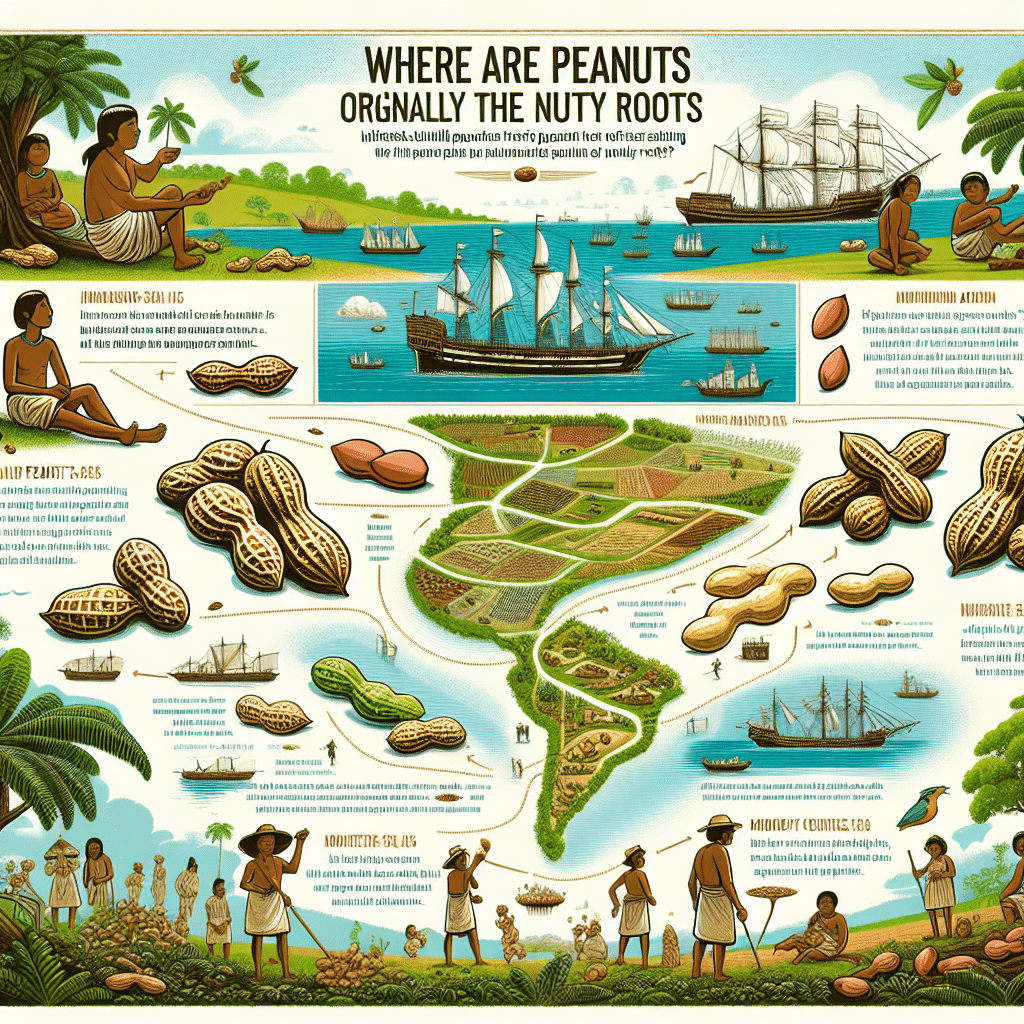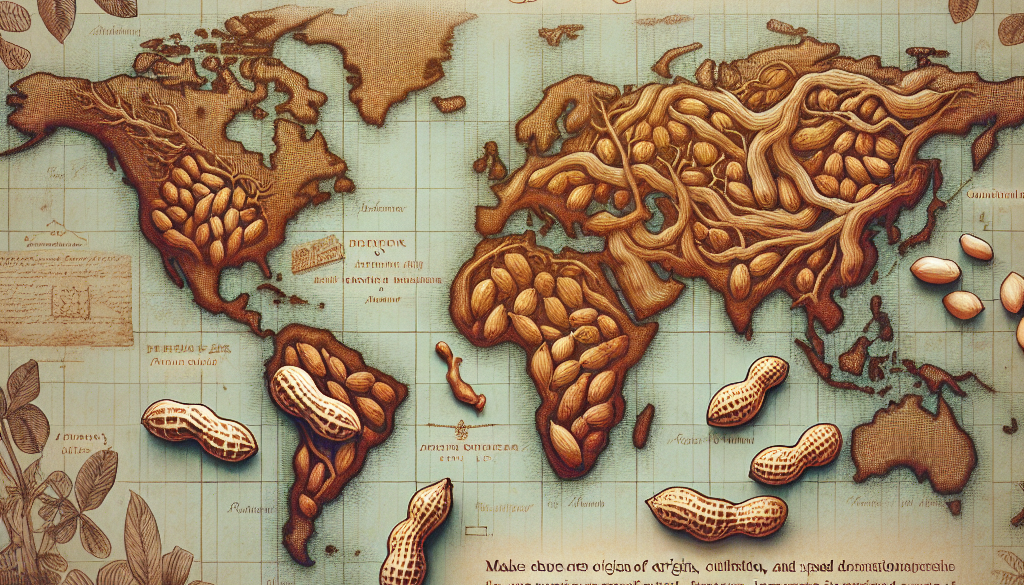Where Are Peanuts Originally From: Uncovering The Nutty Roots
-
Table of Contents
- Peanuts’ Origins Explored: Tracing the Nutty Roots
- The Ancestral Home of Peanuts
- Archaeological Discoveries and Historical Evidence
- Spread Across the Globe
- The Nutritional Profile of Peanuts
- Modern Cultivation and Production
- Challenges and Sustainability
- Conclusion: The Enduring Legacy of Peanuts
- Discover ETprotein’s High-Quality Peanut Protein Products
Peanuts’ Origins Explored: Tracing the Nutty Roots

Peanuts, despite their widespread popularity and inclusion in cuisines around the world, have a mysterious and ancient past that many of us might not be aware of. This humble legume, often mistaken for a nut, has a rich history that dates back thousands of years. In this article, we will delve into the origins of peanuts, exploring where they originally came from and how they have become a global staple.
The Ancestral Home of Peanuts
The story of peanuts begins in South America, where they are believed to have originated. Archaeological evidence suggests that the peanut plant, scientifically known as Arachis hypogaea, was first domesticated in the valleys of Paraguay or Bolivia. Ancient cultures such as the Incas in Peru were known to cultivate peanuts, and they even used them as sacrificial offerings and entombed them with their mummies to aid in the afterlife.
Archaeological Discoveries and Historical Evidence
Archaeologists have unearthed peanut remnants at various sites that date back to 7,600 years ago. These discoveries include pottery shaped like peanuts and decorated with peanut motifs, as well as actual peanut shells found in the excavation sites. The oldest known cultivated peanuts were found in the Bat Cave of New Mexico, dating back to about 5,000 years ago.
Spread Across the Globe
The journey of peanuts from South America to the rest of the world is a fascinating tale of exploration, trade, and colonization. Spanish and Portuguese explorers are credited with introducing peanuts to Africa and Asia in the 16th century, where they quickly became an integral part of local agriculture and cuisine.
- In Africa, peanuts were adopted as a staple crop due to their ability to thrive in the soil and climate conditions.
- In Asia, particularly in China and India, peanuts became an important oilseed crop and a common ingredient in various dishes.
From these continents, peanuts made their way to North America, initially brought over by African slaves. It wasn’t until the 19th century that peanuts gained popularity in the United States, thanks in part to the efforts of agricultural scientist George Washington Carver, who developed over 300 uses for peanuts.
The Nutritional Profile of Peanuts
Peanuts are not only delicious but also packed with nutritional benefits. They are an excellent source of protein, healthy fats, vitamins, and minerals. Here’s a closer look at their nutritional profile:
- Rich in monounsaturated and polyunsaturated fats, which are beneficial for heart health.
- Contain essential nutrients such as magnesium, phosphorus, zinc, niacin, and vitamin E.
- High in antioxidants, which help combat oxidative stress and inflammation.
Due to their high protein content, peanuts are a popular choice among vegetarians and vegans looking to supplement their protein intake.
Modern Cultivation and Production
Today, peanuts are cultivated in tropical and subtropical regions around the world. The leading producers of peanuts are China, India, and the United States. The cultivation process requires well-drained soil, a warm climate, and approximately four to five months of frost-free days to allow the peanut plants to mature.
The production of peanuts has evolved significantly over the years, with advancements in agricultural technology improving yield and efficiency. However, the basic process of planting, growing, harvesting, and drying peanuts remains largely unchanged from ancient times.
Challenges and Sustainability
Despite their popularity, peanut cultivation faces several challenges, including pests, diseases, and environmental concerns. Aflatoxin, a toxic compound produced by certain molds that can grow on peanuts, is a significant health concern that requires careful management and monitoring.
Sustainable farming practices are increasingly important in peanut cultivation to ensure the long-term viability of the crop and to minimize environmental impact. These practices include crop rotation, integrated pest management, and the use of organic fertilizers.
Conclusion: The Enduring Legacy of Peanuts
The history of peanuts is a testament to their resilience and adaptability. From their origins in South America to their current status as a global commodity, peanuts have played a significant role in diets and economies worldwide. Their rich nutritional profile and versatility in cooking make them a valuable food source that continues to be enjoyed by millions.
As we uncover the nutty roots of peanuts, we gain a deeper appreciation for this remarkable legume and its journey through time. The story of peanuts is not just about a plant’s spread across continents; it’s about human innovation, cultural exchange, and the shared history that connects us all through the foods we eat.
Discover ETprotein’s High-Quality Peanut Protein Products
If you’re looking for a sustainable and nutritious protein source, consider ETprotein’s range of protein products. Their peanut protein is just one of the many plant-based proteins they offer, providing a rich source of protein that’s perfect for enhancing your diet or food products.
ETprotein’s commitment to quality and sustainability makes them an excellent choice for consumers and manufacturers alike. Whether you’re developing new food products or seeking to improve your health and nutrition, ETprotein’s protein offerings can meet your needs.
About ETprotein:
ETprotein, a reputable protein Chinese factory manufacturer and supplier, is renowned for producing, stocking, exporting, and delivering the highest quality organic bulk vegan protein and plant proteins. They include Organic rice protein, clear rice protein, pea protein, clear pea protein, pumpkin seed protein, sunflower seed protein, mung bean protein, peanut protein etc. Their offerings, characterized by a neutral taste, non-GMO, allergen-free attributes, cater to a diverse range of industries. They serve nutraceutical, pharmaceutical, cosmeceutical, veterinary, as well as food and beverage finished product distributors, traders, and manufacturers across Europe, USA, Canada, Australia, Thailand, Japan, Korea, Brazil, and Chile, among others.
ETprotein specialization includes exporting and delivering tailor-made protein powder and finished nutritional supplements. Their extensive product range covers sectors like Food and Beverage, Sports Nutrition, Weight Management, Dietary Supplements, Health and Wellness Products, and Infant Formula, ensuring comprehensive solutions to meet all your protein needs.
As a trusted company by leading global food and beverage brands and Fortune 500 companies, ETprotein reinforces China’s reputation in the global arena. For more information or to sample their products, please contact them and email sales(at)ETprotein.com today.












